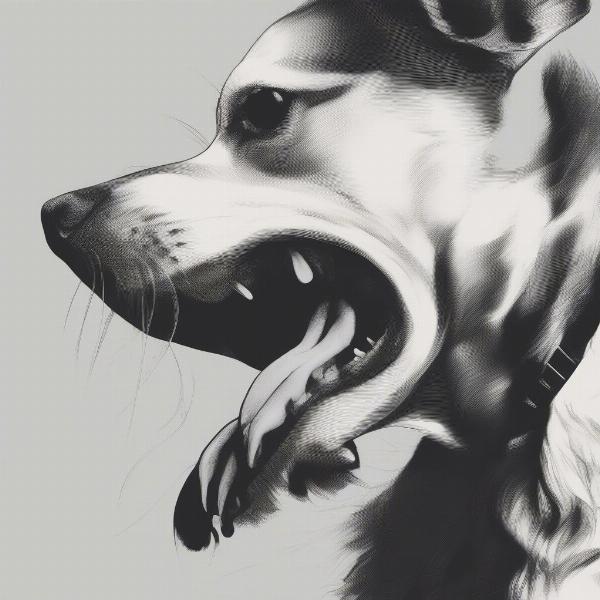Dog chewing their tail base can be a perplexing and concerning behavior for owners. This seemingly simple action can stem from various underlying issues, ranging from minor irritations to more serious medical conditions. Understanding the potential causes, available solutions, and when to seek professional veterinary help is crucial for ensuring your furry friend’s well-being. Let’s delve into the reasons behind this behavior and explore how to address it effectively.
Understanding Why Dogs Chew Their Tail Base
Several factors can contribute to a dog’s compulsion to chew at the base of their tail. Identifying the root cause is the first step towards finding a lasting solution. These causes can be broadly categorized into medical and behavioral reasons.
Medical Reasons for Tail Chewing
- Allergies: Environmental allergens (pollen, dust mites) or food allergies can cause itchy skin, leading to excessive licking and chewing, especially around the tail base.
- Parasites: Fleas, ticks, and mites can infest the area around the tail, causing intense itching and irritation.
- Infections: Bacterial or fungal infections can affect the skin around the tail, leading to discomfort and chewing.
- Hot Spots: These inflamed, moist skin lesions can be incredibly itchy and prone to chewing.
- Anal Gland Issues: Impacted or infected anal glands can cause discomfort and lead to chewing or scooting behavior.
- Injury: A tail injury, such as a pulled muscle or fracture, can trigger chewing.
Behavioral Reasons for Tail Chewing
- Boredom and Anxiety: Dogs left alone for extended periods or experiencing anxiety may develop compulsive behaviors like tail chewing.
- Stress: Changes in routine, new environments, or loud noises can trigger stress-related chewing.
- Obsessive-Compulsive Disorder (OCD): In some cases, tail chewing can be a manifestation of OCD in dogs.
 Dog Chewing Tail Due to Anxiety
Dog Chewing Tail Due to Anxiety
Solutions for Tail Chewing
Once you’ve identified the likely cause, you can implement appropriate solutions. Always consult with a veterinarian to rule out medical conditions before addressing behavioral issues.
Addressing Medical Causes
- Veterinary Care: Your vet can diagnose and treat underlying medical conditions like allergies, parasites, infections, and anal gland issues. They may prescribe medications, topical treatments, or recommend dietary changes.
- Regular Grooming: Regular brushing and bathing can help prevent parasite infestations and manage skin allergies.
Addressing Behavioral Causes
- Environmental Enrichment: Provide plenty of toys, puzzles, and opportunities for exercise to keep your dog mentally and physically stimulated.
- Training and Behavior Modification: Work with a certified dog trainer to address anxiety, stress, and compulsive behaviors. Techniques like desensitization and counter-conditioning can be helpful.
- Stress Reduction: Create a calm and predictable environment for your dog, minimizing exposure to stressors.
- Medication: In some cases, your veterinarian may prescribe medication to manage anxiety or OCD.
When to Worry and Seek Veterinary Help
While occasional tail chewing might be normal, persistent and excessive chewing warrants veterinary attention. Signs to watch out for include:
- Broken skin or bleeding around the tail base.
- Hair loss or thinning fur around the tail.
- Excessive licking or chewing that interferes with normal activities.
- Signs of pain or discomfort, such as whimpering or yelping.
- Changes in appetite or behavior.
Conclusion
Dog chewing their tail base can be a sign of various underlying issues. By understanding the potential causes and implementing appropriate solutions, you can help your furry friend find relief and prevent further complications. Remember to consult with a veterinarian for accurate diagnosis and treatment, especially if the chewing is persistent or accompanied by other symptoms. Early intervention is key to ensuring your dog’s health and happiness.
FAQ
- Can I use over-the-counter medications for my dog’s itchy tail? It’s best to consult your veterinarian before using any medication on your dog, even over-the-counter products.
- How can I tell if my dog’s tail chewing is due to anxiety? Other signs of anxiety may include panting, pacing, destructive behavior, and excessive barking.
- Is it normal for puppies to chew their tails? Puppies may chew their tails during teething or exploration, but persistent chewing should be addressed.
- What are some good toys for a dog that chews its tail? Puzzle toys, chew toys, and interactive toys can help redirect chewing behavior.
- How long does it take for tail chewing to stop after treatment? The timeframe varies depending on the underlying cause and the individual dog.
- Can a dog’s tail become infected from chewing? Yes, excessive chewing can break the skin and lead to bacterial or fungal infections.
- What is the best way to clean a dog’s tail base? Use a gentle pet-safe cleanser and warm water. Avoid harsh chemicals or scrubbing too vigorously.
Related Articles
ILM Dog is your trusted international resource for comprehensive dog care information. We offer expert advice on various aspects of dog ownership, including breed selection, health and medical care, training and behavior, nutrition, grooming, exercise, puppy and senior dog care, and traveling with your dog. As specialists in dog products and accessories, we’re dedicated to providing you with the tools and knowledge you need to keep your canine companion happy and healthy. For further assistance or inquiries, please don’t hesitate to contact us via email at [email protected] or phone at +44 20-3965-8624. Visit ILM Dog for more valuable insights and expert guidance on all things dog-related.